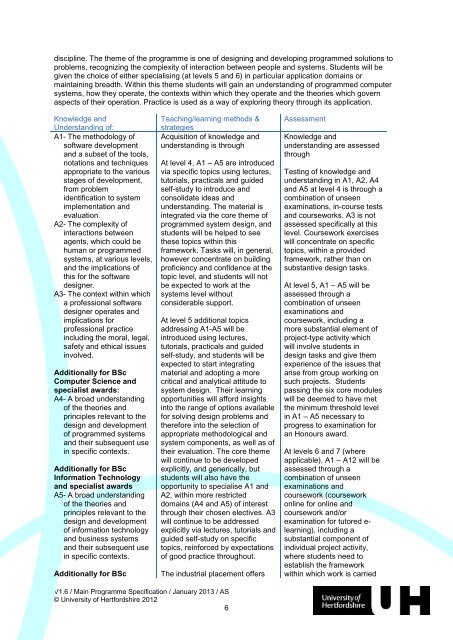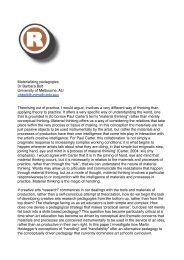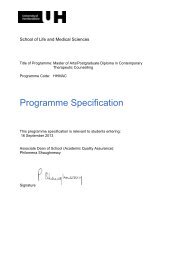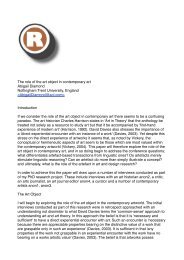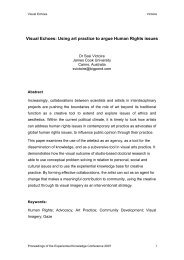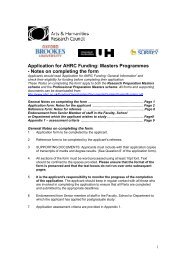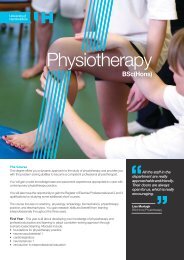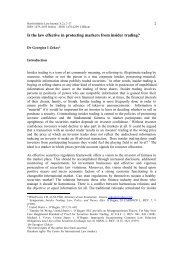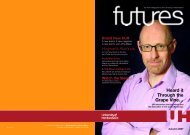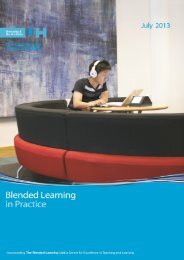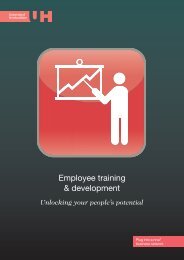Programme specification (pdf) - University of Hertfordshire
Programme specification (pdf) - University of Hertfordshire
Programme specification (pdf) - University of Hertfordshire
Create successful ePaper yourself
Turn your PDF publications into a flip-book with our unique Google optimized e-Paper software.
discipline. The theme <strong>of</strong> the programme is one <strong>of</strong> designing and developing programmed solutions to<br />
problems, recognizing the complexity <strong>of</strong> interaction between people and systems. Students will be<br />
given the choice <strong>of</strong> either specialising (at levels 5 and 6) in particular application domains or<br />
maintaining breadth. Within this theme students will gain an understanding <strong>of</strong> programmed computer<br />
systems, how they operate, the contexts within which they operate and the theories which govern<br />
aspects <strong>of</strong> their operation. Practice is used as a way <strong>of</strong> exploring theory through its application.<br />
Knowledge and<br />
Understanding <strong>of</strong>:<br />
A1- The methodology <strong>of</strong><br />
s<strong>of</strong>tware development<br />
and a subset <strong>of</strong> the tools,<br />
notations and techniques<br />
appropriate to the various<br />
stages <strong>of</strong> development,<br />
from problem<br />
identification to system<br />
implementation and<br />
evaluation.<br />
A2- The complexity <strong>of</strong><br />
interactions between<br />
agents, which could be<br />
human or programmed<br />
systems, at various levels,<br />
and the implications <strong>of</strong><br />
this for the s<strong>of</strong>tware<br />
designer.<br />
A3- The context within which<br />
a pr<strong>of</strong>essional s<strong>of</strong>tware<br />
designer operates and<br />
implications for<br />
pr<strong>of</strong>essional practice<br />
including the moral, legal,<br />
safety and ethical issues<br />
involved.<br />
Additionally for BSc<br />
Computer Science and<br />
specialist awards:<br />
A4- A broad understanding<br />
<strong>of</strong> the theories and<br />
principles relevant to the<br />
design and development<br />
<strong>of</strong> programmed systems<br />
and their subsequent use<br />
in specific contexts.<br />
Additionally for BSc<br />
Information Technology<br />
and specialist awards<br />
A5- A broad understanding<br />
<strong>of</strong> the theories and<br />
principles relevant to the<br />
design and development<br />
<strong>of</strong> information technology<br />
and business systems<br />
and their subsequent use<br />
in specific contexts.<br />
Additionally for BSc<br />
Teaching/learning methods &<br />
strategies<br />
Acquisition <strong>of</strong> knowledge and<br />
understanding is through<br />
At level 4, A1 – A5 are introduced<br />
via specific topics using lectures,<br />
tutorials, practicals and guided<br />
self-study to introduce and<br />
consolidate ideas and<br />
understanding. The material is<br />
integrated via the core theme <strong>of</strong><br />
programmed system design, and<br />
students will be helped to see<br />
these topics within this<br />
framework. Tasks will, in general,<br />
however concentrate on building<br />
pr<strong>of</strong>iciency and confidence at the<br />
topic level, and students will not<br />
be expected to work at the<br />
systems level without<br />
considerable support.<br />
At level 5 additional topics<br />
addressing A1-A5 will be<br />
introduced using lectures,<br />
tutorials, practicals and guided<br />
self-study, and students will be<br />
expected to start integrating<br />
material and adopting a more<br />
critical and analytical attitude to<br />
system design. Their learning<br />
opportunities will afford insights<br />
into the range <strong>of</strong> options available<br />
for solving design problems and<br />
therefore into the selection <strong>of</strong><br />
appropriate methodological and<br />
system components, as well as <strong>of</strong><br />
their evaluation. The core theme<br />
will continue to be developed<br />
explicitly, and generically, but<br />
students will also have the<br />
opportunity to specialise A1 and<br />
A2, within more restricted<br />
domains (A4 and A5) <strong>of</strong> interest<br />
through their chosen electives. A3<br />
will continue to be addressed<br />
explicitly via lectures, tutorials and<br />
guided self-study on specific<br />
topics, reinforced by expectations<br />
<strong>of</strong> good practice throughout.<br />
The industrial placement <strong>of</strong>fers<br />
Assessment<br />
Knowledge and<br />
understanding are assessed<br />
through<br />
Testing <strong>of</strong> knowledge and<br />
understanding in A1, A2, A4<br />
and A5 at level 4 is through a<br />
combination <strong>of</strong> unseen<br />
examinations, in-course tests<br />
and courseworks. A3 is not<br />
assessed specifically at this<br />
level. Coursework exercises<br />
will concentrate on specific<br />
topics, within a provided<br />
framework, rather than on<br />
substantive design tasks.<br />
At level 5, A1 – A5 will be<br />
assessed through a<br />
combination <strong>of</strong> unseen<br />
examinations and<br />
coursework, including a<br />
more substantial element <strong>of</strong><br />
project-type activity which<br />
will involve students in<br />
design tasks and give them<br />
experience <strong>of</strong> the issues that<br />
arise from group working on<br />
such projects. Students<br />
passing the six core modules<br />
will be deemed to have met<br />
the minimum threshold level<br />
in A1 – A5 necessary to<br />
progress to examination for<br />
an Honours award.<br />
At levels 6 and 7 (where<br />
applicable), A1 – A12 will be<br />
assessed through a<br />
combination <strong>of</strong> unseen<br />
examinations and<br />
coursework (coursework<br />
online for online and<br />
coursework and/or<br />
examination for tutored e-<br />
learning), including a<br />
substantial component <strong>of</strong><br />
individual project activity,<br />
where students need to<br />
establish the framework<br />
within which work is carried<br />
V1.6 / Main <strong>Programme</strong> Specification / January 2013 / AS<br />
© <strong>University</strong> <strong>of</strong> <strong>Hertfordshire</strong> 2012<br />
6


